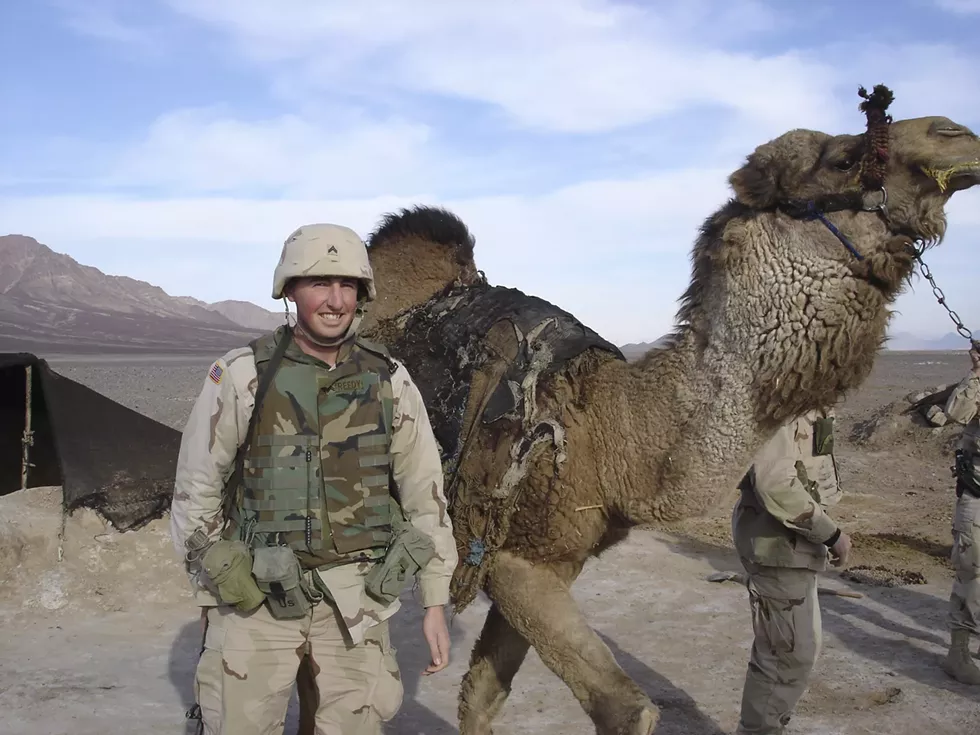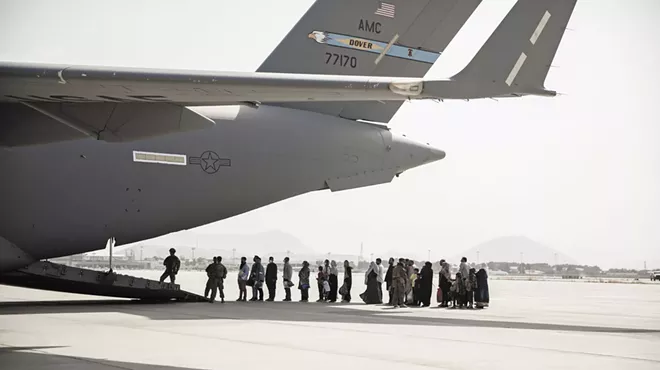
For much of the last two years, the first thing Trent Reedy did when he woke up and the last thing he did before bedtime was message his friend Jawad Arash. More than 6,700 miles and an 11 1/2-hour time difference separated the friends as they communicated between Cheney and Afghanistan.
Often, he'd start with, "You there?"
Every minute that passed without a response sent Reedy's imagination to dark places.
When the U.S. pulled out of Afghanistan starting in July 2021, chaos erupted as the Afghan army collapsed and the president fled. The Taliban seized control of major cities, airports and, by Aug. 15, 2021, the government.
Reedy knew that Arash, who taught English at a university there, was especially at risk.
EDITOR'S NOTE
Trent Reedy and Jawad Arash shared many of their private messages from the last two years with the Inlander. Though we know his real name, for the safety of his relatives who remain in Afghanistan we're using the pen name, Jawad Arash.The two had met in 2004, when Reedy was an American soldier and Arash was a teenager. They wrote a young adult novel together called Enduring Freedom, which was released in May 2021, a month after President Joe Biden announced the U.S. would remove its remaining troops before the 20th anniversary of 9/11.
The slightly fictionalized story offers a message of hope for education and freedom for girls, despite also describing a violent Taliban attack on a school. Perhaps more importantly, the book tells of an unlikely friendship between a young U.S. soldier and an Afghan school kid who drops by to practice his English — a thinly veiled retelling of how the two men met and became close.
Even though Arash hadn't shared the fact that he worked on the book with anyone outside his family, the young man with a wife and three kids — including a newborn — could be found out. For daring to encourage the freedom of expression, Arash could be kidnapped, tortured, killed.
Just months after releasing their book, Reedy was starting to worry that the project had put his friend's life at risk. How could Arash's family leave Afghanistan? And when? How could he help?
On Aug. 18, 2021, Reedy messaged Arash, "We both know when I say 'You there?' I mean, 'Are you alive?'"
"Please don't feel so," Arash replied. "Things will get better."
"I am not in danger. You are in danger."
"I know."
It was one of many daily exchanges the two would have over the next weeks, months and ultimately years as they tried to find a route to safety.
Since 2021, more than 1.6 million Afghan refugees have fled the country, and today more than 8 million are displaced from their homes or the country, according to the U.N.'s refugee agency. That makes them the third-largest group of refugees globally, behind those from Syria and Ukraine.
As Arash and his family would learn time and time again, simply being from Afghanistan can be a disqualifying factor on visa applications. And even with a team of people from around the world calling in favors and raising money to help, the process of finally getting to safety often takes far too long, wreaking havoc on your emotions. One moment there's hope you finally have a solution. The next, those hopes are dashed.
'NO FREEDOM'
In the early days of the withdrawal, Reedy managed to get some money to Arash. But another attempt to send cash was foiled after Western Union temporarily closed in Afghanistan. Meanwhile, as government officials abandoned their posts, Arash struggled to find anyone to legally issue his newborn a passport so his family could leave. The Taliban blocked the roads to the airports, and bribes didn't seem to be getting them anywhere.
Over the course of two days in late August 2021, Arash told Reedy that his friend's wife and his former female student were both trampled to death as they tried to escape on a flight out of Kabul. Another friend with a visa to go to Europe had decided to stay rather than risk having his children crushed by the crowds.
Despite the risks, on Aug. 28, 2021, Arash told Reedy he and his family made it to Kabul by bus.
7:13 am, Pacific Time, REEDY: How was the trip?
7:14 am, ARASH: It was tough... Very tiring...
7:14 am, REEDY: Taliban f— with you?
They had. In an interview with the Inlander this summer, Arash said that Taliban fighters had boarded their bus on the daylong journey from Herat and asked where he was going.
Revealing that they were heading to Kabul could raise suspicions. Although the important documents they'd gathered before fleeing their home were tucked in his wife's clothing (she was less likely to be searched), Arash was nervous.
"In that moment when he asked — it's just God's help — my little one, he started crying, and something struck my mind. I said, 'Oh, the baby is sick,'" Arash said.
There's a well-regarded pediatric facility in Kabul known as the "French Hospital," so he said they were taking their child there.
The Talib looked at the baby crying on Arash's wife's lap, a few rows away. He stared hard at Arash. Then, he got off the bus.
"The babies saved us," Arash said.
The family spent several days in the capital city, hoping to get on an evacuation flight.
9:34 am, Sept. 3, 2021, ARASH: There is very bad firing going on around the Kabul city.
9:35 am, REEDY: Gunshots? Or fires?
9:38 am, REEDY: Are you OK? Are you there?
9:40 am, ARASH: Gunshots. We are OK. We are in a room without windows. Good so far. Very heavy gunshots.
By Sept. 5, it was clear they wouldn't be able to fly out. Arash and Reedy exchanged messages criticizing U.S. politicians for their out-of-touch rhetoric, and discussing how the Taliban was already changing the rules.
10:18 am, Sept. 5, 2021, REEDY: So you're back to no books, no music, no TV, nothing?
10:18:11 am, ARASH: Yes buddy.
10:18:13 am: Nothing.
10:18:19 am: No girls
10:18:24 am: No students
10:18:33 am: No shaving
10:18:37 am: No pants
10:18:41 am: No freedom
10:18:53 am: No innovation
The 40-second burst of messages described a dramatic shift in public life.
So, Arash's family returned to their home in Herat — a house Arash had barely finished building with the proceeds from their book before everything changed.
7:43 am, Sept 22, 2021, REEDY: Are you alive?
7:45 am, ARASH: Only alive man.
He'd spent three days waiting in line trying to get money out of his account. He also heard the passport office might reopen, but he wasn't sure.
8:20 am, REEDY: I do not understand why they won't let people leave.
8:21 am, ARASH: They want to take revenge, man.
The messages weighed heavily on Reedy. Two days later, Reedy shared that he'd been telling his Facebook friends he was having nightmares about Afghanistan and couldn't sleep well. He couldn't imagine what his friend was going through.
When Reedy was 20, his father was killed in a gas pipeline explosion. Someone was digging where they weren't supposed to and hit the line.
"I would have dreams after this, dreams where I'm like, back in time, and I'm on the site, and I'm trying to run, like, 'Hey, you guys gotta get out of here, it's going to go,'" Reedy said. "I never made it on time in the dream."
But after what he calls "the Betrayal of Afghanistan," Reedy started having nightmares about saving Arash.
"This was different. Like you know this thing is out there, this nightmare," Reedy says. "Failure of this mission is death and torture for a wonderful family. All of them, kids included."
5:23 am, Sept. 26, 2021, ARASH: There you go. Music is banned from public places. And we cannot shave or shorten our beards anymore. Things are starting.
Reedy said he's surprised it took so long.
"They were afraid of the world. They are starting slowly," Arash said. "These motherf—ers are never going to change."
"You should write about it," Reedy said. "Tell America about it."
"I can't risk it while I am trapped here man. They hanged 4 people yesterday."
UNLIKELY FRIENDSHIP
Sitting on a couch in the corner of West Plains Roasters coffee shop in Cheney last month, Reedy explained that he never really struggled with post-traumatic stress disorder after serving in Afghanistan. But after "the betrayal," he started to have anger issues. He was drinking more. It started to feel like the last 20 years meant nothing. His time became consumed with helping Arash and fielding messages from others like him who were trying to get out.
"I was far better after the war physically, attitude, mentally," Reedy said. "But after the betrayal, it was nightmares. That was the beginning of like two years of never making it through the whole night."
His wife would ask why he kept his iPad by the bed. He insisted he needed it in case Arash reached out. After waking in the middle of the night, he'd often head to their spare bedroom where he'd put on old episodes of Doctor Who to try to fall back to sleep.
Looking back on it, Reedy's not proud of the mindset he had when he first went to Afghanistan. He'd signed up as an Iowa Army national guardsman in 1999 for the college money, but when he learned he'd be deployed a few years after 9/11 he was angry, ready to fight.
"I was terrified. ... I'd never gone further west than Colorado," Reedy said. "I made this naive mistake that they make, blaming all the Afghans, really probably all Muslims. I was that guy. I'm really ashamed about this."
But instead of fighting, when he got to Farah in 2004 he learned that his assignment was to help the people of Afghanistan rebuild their cities, construct schools and establish a stable system of government. By the end of his time there, Reedy said he had a great respect for Afghans and their struggles.
One of the people he met was Arash, who was still in high school. A classmate had told Arash about a soldier on a tower nearby who was willing to converse in English. Arash learned English during elementary school, when his family was in Pakistan as refugees of yet another conflict. So he'd drop by a couple days a week to chat.
Realistically, the two only spent several months together before Reedy went home and was replaced with other soldiers. Within a few years, Arash's family had built a business contracting with the U.S. military to make deliveries and complete odd jobs.
As Arash worked to go to university, he created his first email account. But no one he knew had one. That's when he remembered Reedy had left his address on a scrap of paper.
"My first ever email went to Trent," Arash said.
The two ended up staying in touch.
Arash, who speaks Pashto, Persian and Urdu, kept studying English. He got a Fulbright scholarship to come study in the U.S. in 2013. After he returned at the end of 2014, he taught English for a while before going to India in 2017 to work on a doctorate. Before he was able to finish that degree, the pandemic forced his return to Afghanistan.
It was around that time that Reedy and Arash started working on their book.
Reedy had already written about his experiences in Afghanistan, including about a girl with a cleft lip who he helped get surgery. He encouraged Arash to share his own stories.
Arash said he wasn't sure he had anything to share. But then Reedy asked where he was when he learned about 9/11.
At that time, Arash's family had been living next door to a Taliban family. Arash's grandfather — a "very, very brave person" who'd stood up to their neighbor's threats — was fine with them having a television, but the family hid its existence by hanging thick blankets over their windows to block the bright reflections. The volume had to be turned down low.
About a week before the anti-Taliban leader Ahmad Shah Massoud was assassinated on Sept. 9, 2001, Arash says there was suddenly a moving truck next door. The Taliban family left. It seemed like they knew something was going to happen, Arash says.
The day after 9/11, Arash's uncle heard people in the city talking about something in the U.S. and the family got ahold of a VHS news recording from a friend who had satellite TV. Even though the neighbors were gone, they blocked the windows and turned down the sound before learning what had happened.
"My grandfather said, 'I'm not going to escape to Pakistan again, man. Because I'm sure that war starts the way the Russians did. They'll come and kill, and then we will start fighting among ourselves,'" Arash said. "Although what he said didn't apply in those 20 years, after 20 years we started destroying ourselves again."
FIRST STEP: PAKISTAN
After "the betrayal," Arash's family remained in Afghanistan for several months. Arash continued teaching, keeping a low profile. He declined a promotion. He didn't tell his relatives he was trying to leave.
In March 2022, Reedy told Arash to keep an eye out for a message from a group associated with Glenn Beck, a conservative American talk show host with millions of listeners. The group was working to get people out, and Reedy's contacts in the U.S. had asked them to help Arash. Arash was still hoping to return to India to finish his Ph.D., but suddenly a man reached out, saying he was working on getting Arash's family visas for Pakistan.
It felt sketchy, at best. On March 28, 2022, Arash told Reedy he thought the man who contacted him was fake. Arash didn't ask to go to Pakistan. The man didn't introduce himself as someone from the organization.
Reedy confirmed that the guy was legitimate, but Arash said it was going to be difficult to make a move soon. Ramadan was about to start, and traveling without eating all day wouldn't work. Reedy insisted that Arash would be good with God if he had to break the fast to get his family to safety.
Two more months passed before the family returned to Kabul, ready to leave. They'd been coordinating with the American group, and this time they'd brought many of their things.
Out of fear that someone might let a detail slip to the wrong person, they didn't tell their family goodbye until they were just about to board the plane.
"Ten minutes to boarding, I called my uncle and father and everybody and said that we are leaving," Arash said. "My father and uncle got really angry and sad that 'You are letting us know now?' But I really didn't know what to do."
On June 2, 2022, Arash told Reedy his family had landed in Pakistan.
"Thanks be to GOD!!!!!!!!" Reedy said. "You're OUT!!!"
"YES," Arash said. "We got out."
Reedy jokingly told Arash to go find some of the "horrible" music he likes, and they bantered back and forth.
6:08:12 am, REEDY: you could even dance
6:08:19 am: Maybe get yourself a shave
6:08:36 am: but do not dance and shave at the same time
6:08:40 am, ARASH: I am going to get a French cut right away.
6:08:42 am: Hahahah
By June 8, 2022, Arash had rented an apartment for the equivalent of $99, and spent $800 to file online applications to try to get to the U.S.
But over the next several months, the family would end up searching for any available option to get to safety.
WHO WILL TAKE US?
After a few months in Pakistan, the family's visas expired, leaving them in hiding. They had to find the right people to pay an "administrative fee," buying them a few more months. Until they were cleared, Reedy sent crowdfunded money via friends of friends to help the family survive.Reedy and Arash considered getting the family to Mexico, where it might be easier to cross the U.S. border and seek asylum. But getting approval to fly there proved too difficult.
Arash applied to teach English in Vietnam, only to be told he'd have to mail his paperwork to Kabul for approval before he could get the final OK. In other words, he'd have to get permission from the Taliban to leave. That plan was out.
Reedy asked his thousands of Facebook friends for other options, and he started learning about immigration policies for countries he didn't even know existed.
"There's no place on Earth. We were seriously looking at places like Rwanda, Haiti," Reedy said. "Often it would be like 'It's easy to come to this country, you'll love it here.' And then there's a little thing at the bottom, 'Oh wait, are you Afghan? No, no, no, no, no. Not a chance.'"
By the end of 2022, an American couple that had never met Arash offered to put up $28,000 for his family to apply to live in Canada, and Reedy found a resident to sponsor them.
Just as they were about to start the formal paperwork for that process early this year, Arash heard from the U.S. State Department.
On Feb. 13, he learned that his student visa was coming together, and he turned over his passport. He'd be getting his doctorate at Indiana State University.
Reedy was ecstatic, promising to bring gifts for Arash's wife and kids and meet them when they landed.
But just a day later, Arash learned that the program he'd gotten into had been eliminated by the university.
8:56 am, Feb. 14, REEDY: There's gotta be something else you can study in Indiana.
9:00:02 am, ARASH: The problem is that all my documents are processed for a PhD in Curriculum and Instruction at ISU. [I'm] afraid if anything changes that [it] will take another 6 months to process the visa. You know that.
9:00:27 am: I guess I should forget all about it.
9:00:43 am: It's just so disappointing.
Within a few hours, Reedy said he'd ask ISU to let Arash into another program, and he offered to reach out to Eastern Washington University. Then, Arash said his former professor at ISU wrote back to him, saying they might be able to figure out another program.
The next day, Reedy learned that an Afghan who worked with his military unit had been taken by the Taliban.
6:53 am, Feb. 15, ARASH: This is what awaits us if we go back. Man.
Arash knows others who were taken.
At a public speaking event, a former colleague of Arash's had been asked to weigh in on the economic situation under the Taliban. He'd been honest, saying they didn't have the expertise, Arash says. The man disappeared for 10 or 12 days before being released. Since his abduction, he hasn't spoken to anyone.
"They torture you and then they tell you that 'Now, you dare talk to someone about it,'" Arash said. "They just silence you forever."
Five years ago, Arash remembers getting harassing phone calls insisting that he not fail a student in his class. Arash explained that the student hadn't met the standards. One of the callers said, "I'm from the people of the mountain ... pass this kid, or we have people everywhere."
He failed the student. "So then I got a bit scared," Arash said, though nothing seemed to come of the threats.
He hadn't thought about the incident for years until his brother contacted him in Pakistan to say that Arash had been issued a court summons.
"There was nothing stated, but I'm assuming that he might have claimed that 'This guy intentionally failed me because he knew that I was working for you,'" Arash said, referring to the Taliban. "'And now I want him to come and repent.'"

ZERO HOUR
With help from people at Indiana State University, Arash was able to rapidly apply for a new academic program, in educational administration, and by early this summer, it finally looked like Arash and his family would be able to make their way to the U.S.
Just two weeks before the family was set to fly out, Arash got yet another call that seemed like it could ruin their plans. Someone from Pakistan's Ministry of Interior wanted to know why they extended their medical visa stay.
"I thought that might just be a scam," Arash said.
But then he talked to some friends who said the same thing happened to other Afghans in Pakistan. In some cases, officials showed up and confiscated a family's passports, demanding money to get them back.
Arash considered moving up their departure date, but he worried that if the officials dropped by and saw he'd changed his plans, he would get flagged.
Instead, Reedy helped them pay about $150 for an "exit pass," which granted them a 15-day legal stay on their way out of the country.
Finally, by July 24, Reedy was on his way to Chicago with a friend from high school — she was there to help Arash's wife feel more comfortable when they arrived — and Arash and his family finally got on their first plane to freedom.
8:19:06 am, July 24, ARASH: Rolling.
8:19:09 am: Just started.
8:19:30 am: Phones off.
8:19:47 am, REEDY: Got it.
8:19:55 am: Good luck.
12:34 pm, ARASH: We just got down to Abu Dhabi.
The next day, Reedy donned a chapan — or, as he calls it, a "Karzai coat" — that he hadn't worn in 18 years, and waited in the baggage claim area for the international arrivals.
As their plane taxied, Arash told his wife to get ready for what could be an hourslong security check. But since they'd already sat through a long check in Abu Dhabi, they were able to walk right through to the baggage area in Chicago, where they found their friend.
"I couldn't believe it," Arash said. "We greeted each other, and still when I was greeting, I was thinking, 'Where are the police officers? They need to search us first.' And Trent told me that, 'Man, this is the exit, I guess we are done.'"
"It was glorious," Reedy said. "I spent two years imagining this moment, when I'd finally be able to see him, and they'd be safe. The reality couldn't possibly live up to the anticipation and the fantasy."
"I didn't have any words," Arash said.
Over the next few days, they helped the family shop for beds and basic necessities. Reedy gave Arash a set of crystal bookends he bought at Wonders of the World in the Flour Mill in Spokane. It felt like a fitting way to stick it to the Taliban.
"No one's going to tell you what you can and can't read anymore," Reedy said. "So build up your library and enjoy the freedom."
Now safe and settled in Indiana, Arash is working toward his degree. The solution isn't perfect — he can't work enough to pay their rent because of the restrictions on his student visa. And, truthfully, he still has mixed feelings about being forced to leave his home country. In some ways, it feels like a collective failure.
"I sometimes blame myself as a teacher," Arash says. "I think teachers failed."
After 20 years of opportunity, they weren't able to change the minds of "people who were against humanity," Arash says.
But he's hopeful that this chance to start again is the best thing, especially for his children.
"I have to get them a brighter future." ♦



















